Ethical Issues at Union Carbide: A Case Study
VerifiedAdded on 2022/12/28
|7
|1999
|96
AI Summary
This report discusses the ethical issues faced by Union Carbide Corporation in the Bhopal gas tragedy. It explores the philosophical theories of ethics and management practices that could have been implemented. The case study highlights the importance of ethical decision-making and the need for responsible corporate behavior.
Contribute Materials
Your contribution can guide someone’s learning journey. Share your
documents today.
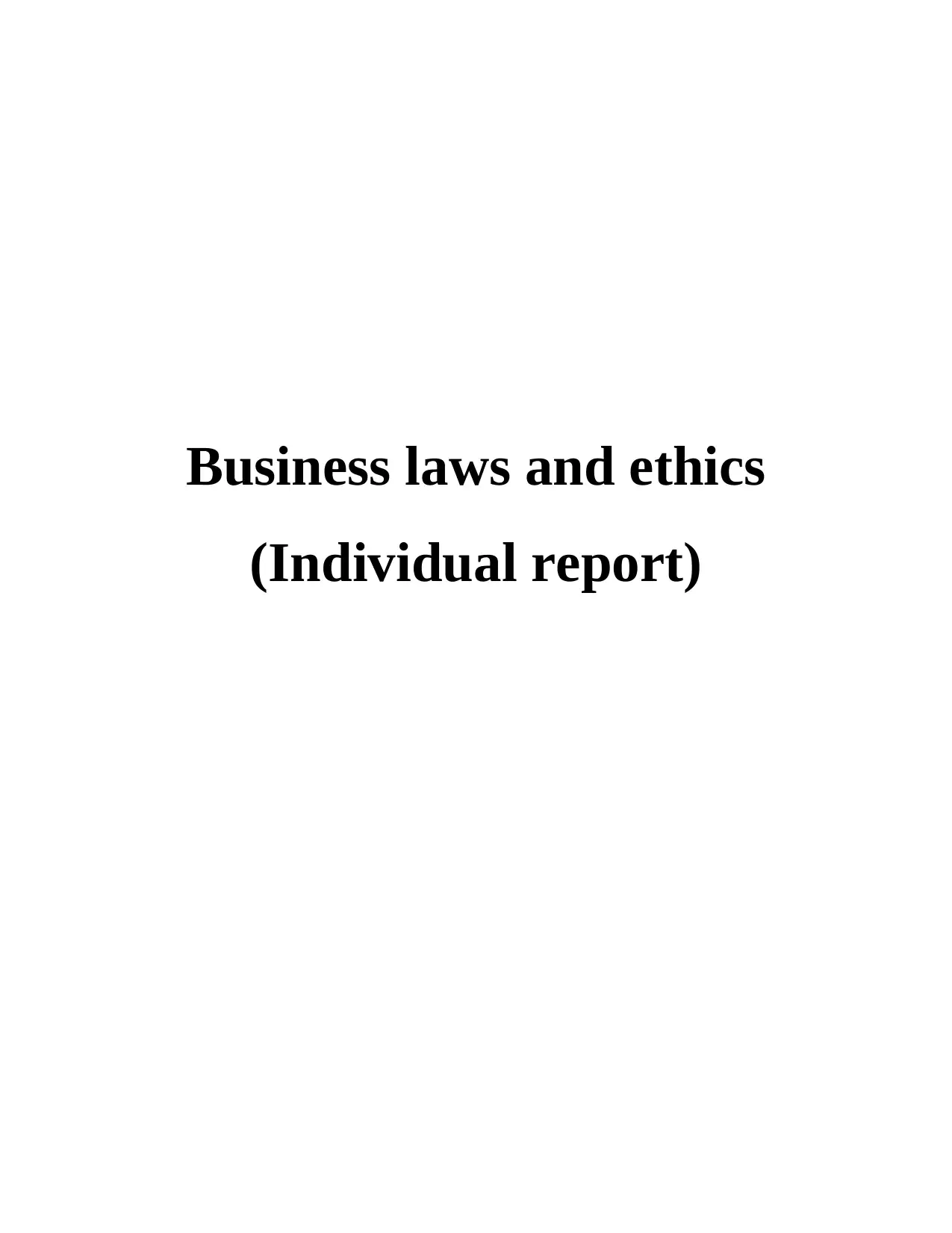
Business laws and ethics
(Individual report)
(Individual report)
Secure Best Marks with AI Grader
Need help grading? Try our AI Grader for instant feedback on your assignments.
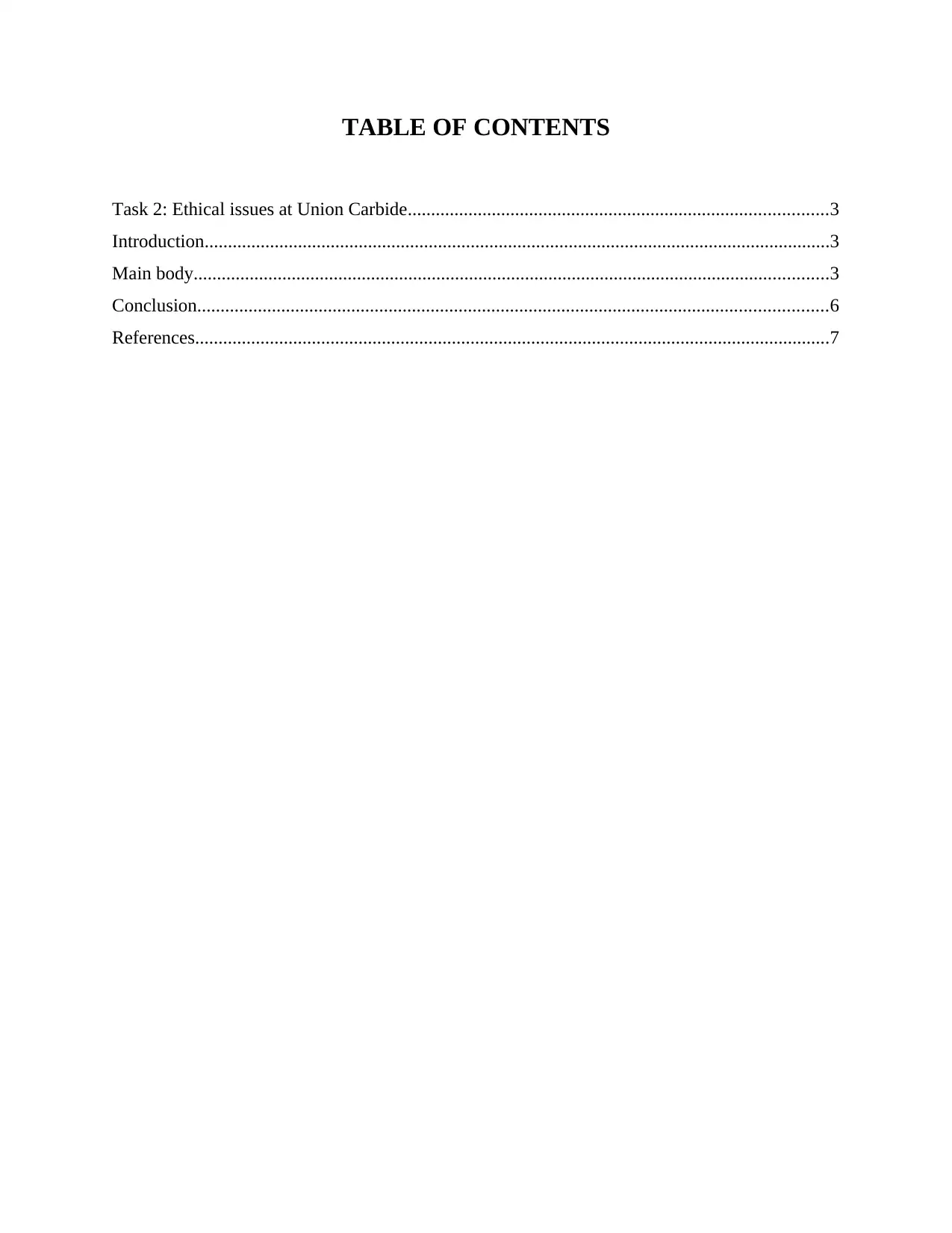
TABLE OF CONTENTS
Task 2: Ethical issues at Union Carbide..........................................................................................3
Introduction......................................................................................................................................3
Main body........................................................................................................................................3
Conclusion.......................................................................................................................................6
References........................................................................................................................................7
Task 2: Ethical issues at Union Carbide..........................................................................................3
Introduction......................................................................................................................................3
Main body........................................................................................................................................3
Conclusion.......................................................................................................................................6
References........................................................................................................................................7
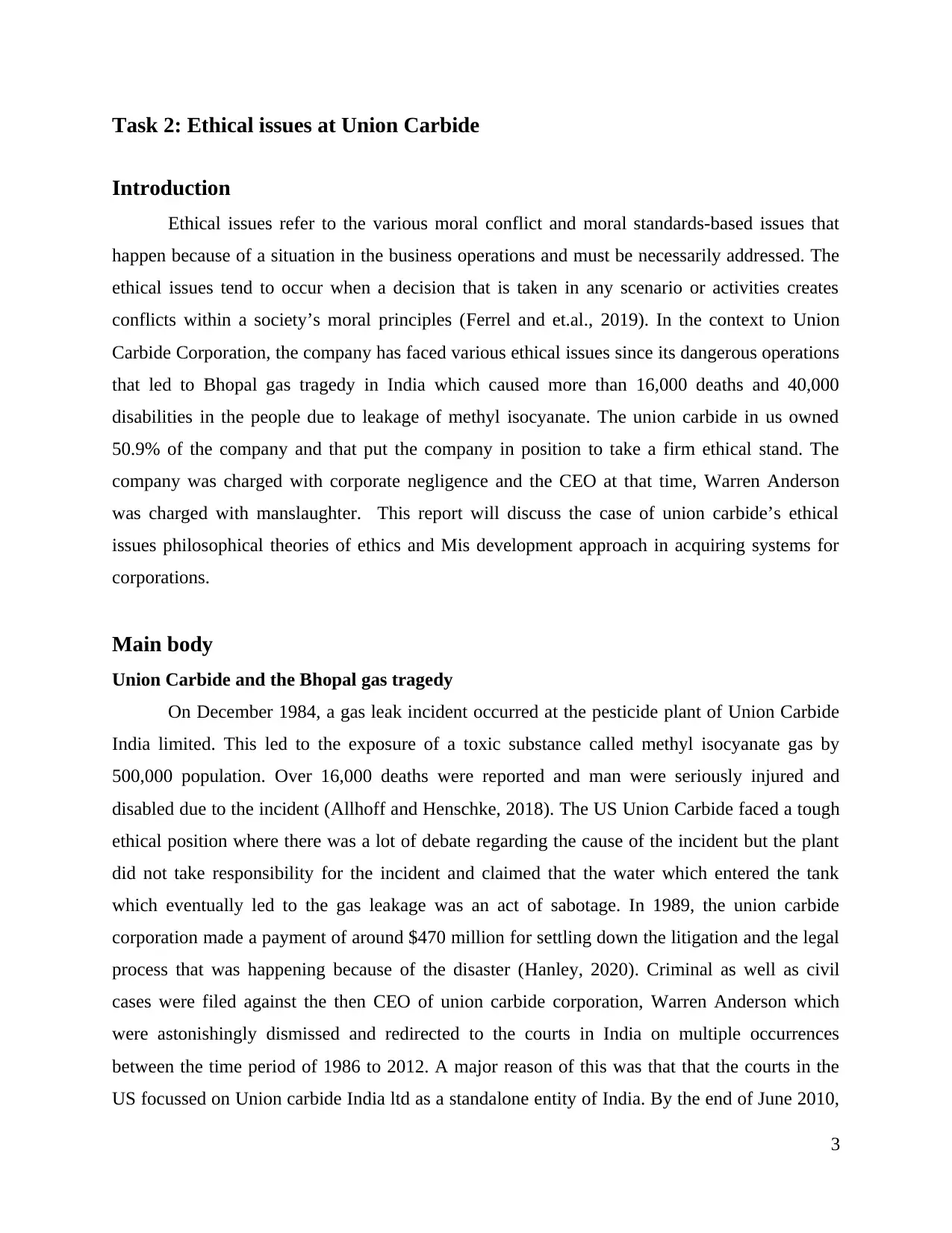
Task 2: Ethical issues at Union Carbide
Introduction
Ethical issues refer to the various moral conflict and moral standards-based issues that
happen because of a situation in the business operations and must be necessarily addressed. The
ethical issues tend to occur when a decision that is taken in any scenario or activities creates
conflicts within a society’s moral principles (Ferrel and et.al., 2019). In the context to Union
Carbide Corporation, the company has faced various ethical issues since its dangerous operations
that led to Bhopal gas tragedy in India which caused more than 16,000 deaths and 40,000
disabilities in the people due to leakage of methyl isocyanate. The union carbide in us owned
50.9% of the company and that put the company in position to take a firm ethical stand. The
company was charged with corporate negligence and the CEO at that time, Warren Anderson
was charged with manslaughter. This report will discuss the case of union carbide’s ethical
issues philosophical theories of ethics and Mis development approach in acquiring systems for
corporations.
Main body
Union Carbide and the Bhopal gas tragedy
On December 1984, a gas leak incident occurred at the pesticide plant of Union Carbide
India limited. This led to the exposure of a toxic substance called methyl isocyanate gas by
500,000 population. Over 16,000 deaths were reported and man were seriously injured and
disabled due to the incident (Allhoff and Henschke, 2018). The US Union Carbide faced a tough
ethical position where there was a lot of debate regarding the cause of the incident but the plant
did not take responsibility for the incident and claimed that the water which entered the tank
which eventually led to the gas leakage was an act of sabotage. In 1989, the union carbide
corporation made a payment of around $470 million for settling down the litigation and the legal
process that was happening because of the disaster (Hanley, 2020). Criminal as well as civil
cases were filed against the then CEO of union carbide corporation, Warren Anderson which
were astonishingly dismissed and redirected to the courts in India on multiple occurrences
between the time period of 1986 to 2012. A major reason of this was that that the courts in the
US focussed on Union carbide India ltd as a standalone entity of India. By the end of June 2010,
3
Introduction
Ethical issues refer to the various moral conflict and moral standards-based issues that
happen because of a situation in the business operations and must be necessarily addressed. The
ethical issues tend to occur when a decision that is taken in any scenario or activities creates
conflicts within a society’s moral principles (Ferrel and et.al., 2019). In the context to Union
Carbide Corporation, the company has faced various ethical issues since its dangerous operations
that led to Bhopal gas tragedy in India which caused more than 16,000 deaths and 40,000
disabilities in the people due to leakage of methyl isocyanate. The union carbide in us owned
50.9% of the company and that put the company in position to take a firm ethical stand. The
company was charged with corporate negligence and the CEO at that time, Warren Anderson
was charged with manslaughter. This report will discuss the case of union carbide’s ethical
issues philosophical theories of ethics and Mis development approach in acquiring systems for
corporations.
Main body
Union Carbide and the Bhopal gas tragedy
On December 1984, a gas leak incident occurred at the pesticide plant of Union Carbide
India limited. This led to the exposure of a toxic substance called methyl isocyanate gas by
500,000 population. Over 16,000 deaths were reported and man were seriously injured and
disabled due to the incident (Allhoff and Henschke, 2018). The US Union Carbide faced a tough
ethical position where there was a lot of debate regarding the cause of the incident but the plant
did not take responsibility for the incident and claimed that the water which entered the tank
which eventually led to the gas leakage was an act of sabotage. In 1989, the union carbide
corporation made a payment of around $470 million for settling down the litigation and the legal
process that was happening because of the disaster (Hanley, 2020). Criminal as well as civil
cases were filed against the then CEO of union carbide corporation, Warren Anderson which
were astonishingly dismissed and redirected to the courts in India on multiple occurrences
between the time period of 1986 to 2012. A major reason of this was that that the courts in the
US focussed on Union carbide India ltd as a standalone entity of India. By the end of June 2010,
3
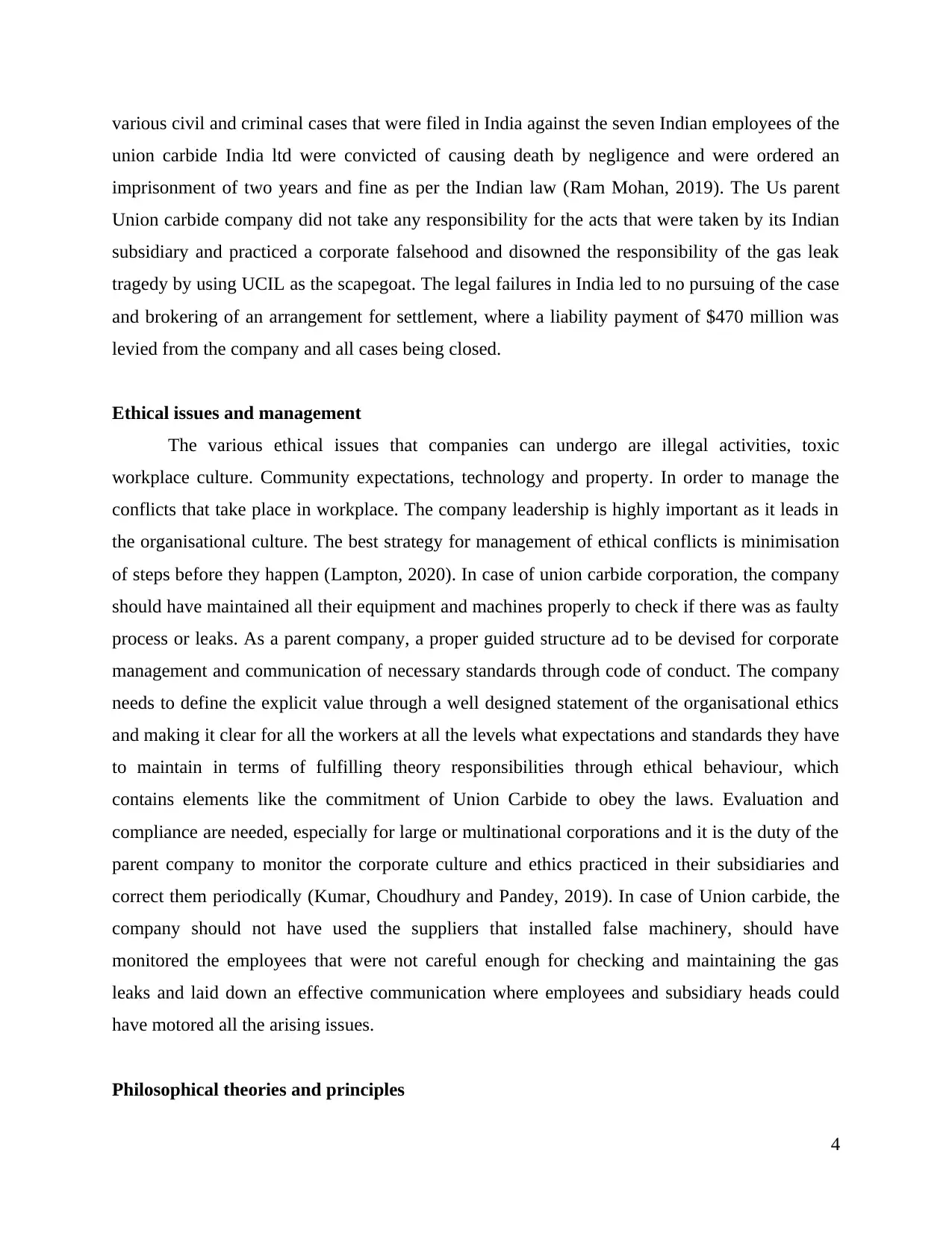
various civil and criminal cases that were filed in India against the seven Indian employees of the
union carbide India ltd were convicted of causing death by negligence and were ordered an
imprisonment of two years and fine as per the Indian law (Ram Mohan, 2019). The Us parent
Union carbide company did not take any responsibility for the acts that were taken by its Indian
subsidiary and practiced a corporate falsehood and disowned the responsibility of the gas leak
tragedy by using UCIL as the scapegoat. The legal failures in India led to no pursuing of the case
and brokering of an arrangement for settlement, where a liability payment of $470 million was
levied from the company and all cases being closed.
Ethical issues and management
The various ethical issues that companies can undergo are illegal activities, toxic
workplace culture. Community expectations, technology and property. In order to manage the
conflicts that take place in workplace. The company leadership is highly important as it leads in
the organisational culture. The best strategy for management of ethical conflicts is minimisation
of steps before they happen (Lampton, 2020). In case of union carbide corporation, the company
should have maintained all their equipment and machines properly to check if there was as faulty
process or leaks. As a parent company, a proper guided structure ad to be devised for corporate
management and communication of necessary standards through code of conduct. The company
needs to define the explicit value through a well designed statement of the organisational ethics
and making it clear for all the workers at all the levels what expectations and standards they have
to maintain in terms of fulfilling theory responsibilities through ethical behaviour, which
contains elements like the commitment of Union Carbide to obey the laws. Evaluation and
compliance are needed, especially for large or multinational corporations and it is the duty of the
parent company to monitor the corporate culture and ethics practiced in their subsidiaries and
correct them periodically (Kumar, Choudhury and Pandey, 2019). In case of Union carbide, the
company should not have used the suppliers that installed false machinery, should have
monitored the employees that were not careful enough for checking and maintaining the gas
leaks and laid down an effective communication where employees and subsidiary heads could
have motored all the arising issues.
Philosophical theories and principles
4
union carbide India ltd were convicted of causing death by negligence and were ordered an
imprisonment of two years and fine as per the Indian law (Ram Mohan, 2019). The Us parent
Union carbide company did not take any responsibility for the acts that were taken by its Indian
subsidiary and practiced a corporate falsehood and disowned the responsibility of the gas leak
tragedy by using UCIL as the scapegoat. The legal failures in India led to no pursuing of the case
and brokering of an arrangement for settlement, where a liability payment of $470 million was
levied from the company and all cases being closed.
Ethical issues and management
The various ethical issues that companies can undergo are illegal activities, toxic
workplace culture. Community expectations, technology and property. In order to manage the
conflicts that take place in workplace. The company leadership is highly important as it leads in
the organisational culture. The best strategy for management of ethical conflicts is minimisation
of steps before they happen (Lampton, 2020). In case of union carbide corporation, the company
should have maintained all their equipment and machines properly to check if there was as faulty
process or leaks. As a parent company, a proper guided structure ad to be devised for corporate
management and communication of necessary standards through code of conduct. The company
needs to define the explicit value through a well designed statement of the organisational ethics
and making it clear for all the workers at all the levels what expectations and standards they have
to maintain in terms of fulfilling theory responsibilities through ethical behaviour, which
contains elements like the commitment of Union Carbide to obey the laws. Evaluation and
compliance are needed, especially for large or multinational corporations and it is the duty of the
parent company to monitor the corporate culture and ethics practiced in their subsidiaries and
correct them periodically (Kumar, Choudhury and Pandey, 2019). In case of Union carbide, the
company should not have used the suppliers that installed false machinery, should have
monitored the employees that were not careful enough for checking and maintaining the gas
leaks and laid down an effective communication where employees and subsidiary heads could
have motored all the arising issues.
Philosophical theories and principles
4
Secure Best Marks with AI Grader
Need help grading? Try our AI Grader for instant feedback on your assignments.
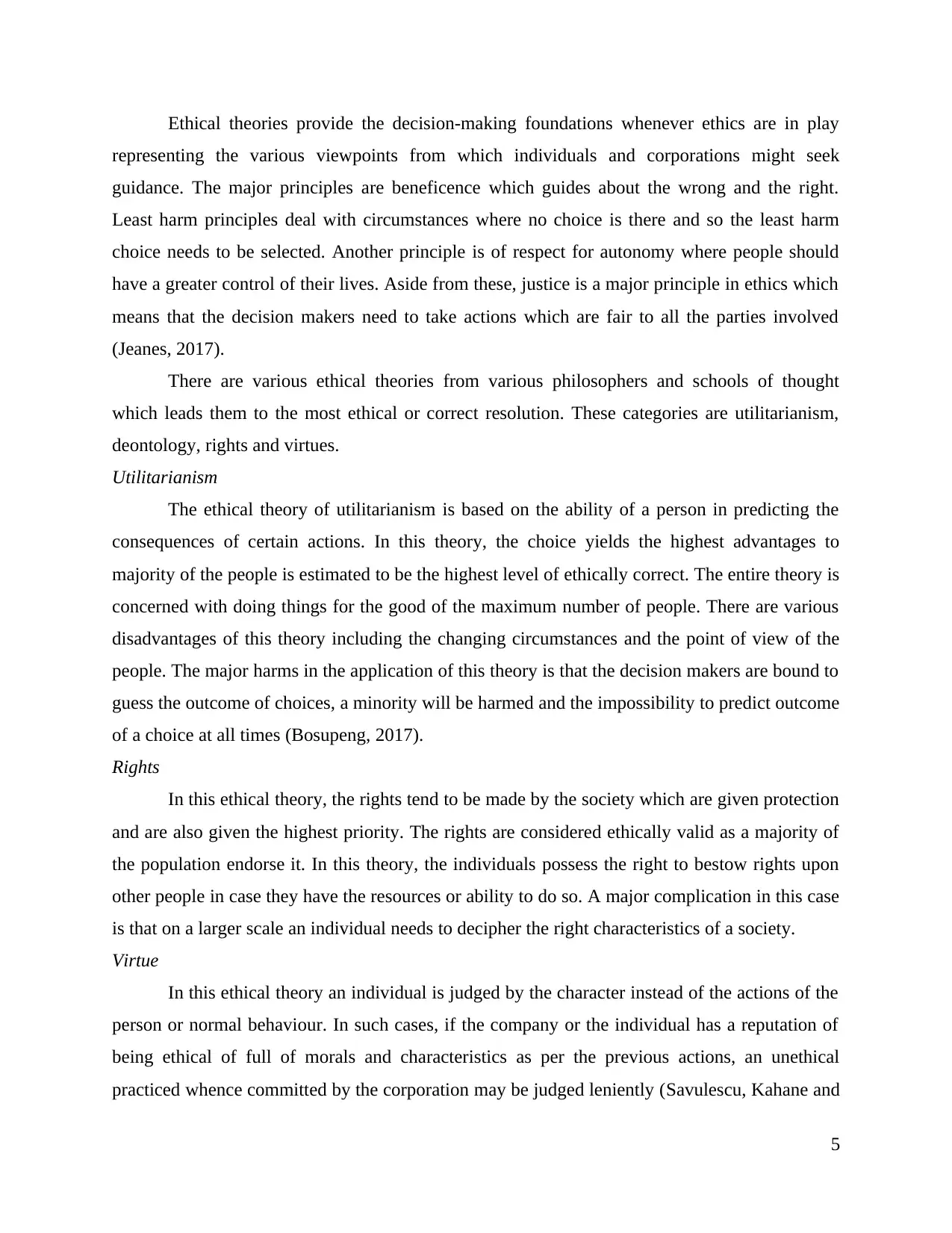
Ethical theories provide the decision-making foundations whenever ethics are in play
representing the various viewpoints from which individuals and corporations might seek
guidance. The major principles are beneficence which guides about the wrong and the right.
Least harm principles deal with circumstances where no choice is there and so the least harm
choice needs to be selected. Another principle is of respect for autonomy where people should
have a greater control of their lives. Aside from these, justice is a major principle in ethics which
means that the decision makers need to take actions which are fair to all the parties involved
(Jeanes, 2017).
There are various ethical theories from various philosophers and schools of thought
which leads them to the most ethical or correct resolution. These categories are utilitarianism,
deontology, rights and virtues.
Utilitarianism
The ethical theory of utilitarianism is based on the ability of a person in predicting the
consequences of certain actions. In this theory, the choice yields the highest advantages to
majority of the people is estimated to be the highest level of ethically correct. The entire theory is
concerned with doing things for the good of the maximum number of people. There are various
disadvantages of this theory including the changing circumstances and the point of view of the
people. The major harms in the application of this theory is that the decision makers are bound to
guess the outcome of choices, a minority will be harmed and the impossibility to predict outcome
of a choice at all times (Bosupeng, 2017).
Rights
In this ethical theory, the rights tend to be made by the society which are given protection
and are also given the highest priority. The rights are considered ethically valid as a majority of
the population endorse it. In this theory, the individuals possess the right to bestow rights upon
other people in case they have the resources or ability to do so. A major complication in this case
is that on a larger scale an individual needs to decipher the right characteristics of a society.
Virtue
In this ethical theory an individual is judged by the character instead of the actions of the
person or normal behaviour. In such cases, if the company or the individual has a reputation of
being ethical of full of morals and characteristics as per the previous actions, an unethical
practiced whence committed by the corporation may be judged leniently (Savulescu, Kahane and
5
representing the various viewpoints from which individuals and corporations might seek
guidance. The major principles are beneficence which guides about the wrong and the right.
Least harm principles deal with circumstances where no choice is there and so the least harm
choice needs to be selected. Another principle is of respect for autonomy where people should
have a greater control of their lives. Aside from these, justice is a major principle in ethics which
means that the decision makers need to take actions which are fair to all the parties involved
(Jeanes, 2017).
There are various ethical theories from various philosophers and schools of thought
which leads them to the most ethical or correct resolution. These categories are utilitarianism,
deontology, rights and virtues.
Utilitarianism
The ethical theory of utilitarianism is based on the ability of a person in predicting the
consequences of certain actions. In this theory, the choice yields the highest advantages to
majority of the people is estimated to be the highest level of ethically correct. The entire theory is
concerned with doing things for the good of the maximum number of people. There are various
disadvantages of this theory including the changing circumstances and the point of view of the
people. The major harms in the application of this theory is that the decision makers are bound to
guess the outcome of choices, a minority will be harmed and the impossibility to predict outcome
of a choice at all times (Bosupeng, 2017).
Rights
In this ethical theory, the rights tend to be made by the society which are given protection
and are also given the highest priority. The rights are considered ethically valid as a majority of
the population endorse it. In this theory, the individuals possess the right to bestow rights upon
other people in case they have the resources or ability to do so. A major complication in this case
is that on a larger scale an individual needs to decipher the right characteristics of a society.
Virtue
In this ethical theory an individual is judged by the character instead of the actions of the
person or normal behaviour. In such cases, if the company or the individual has a reputation of
being ethical of full of morals and characteristics as per the previous actions, an unethical
practiced whence committed by the corporation may be judged leniently (Savulescu, Kahane and
5
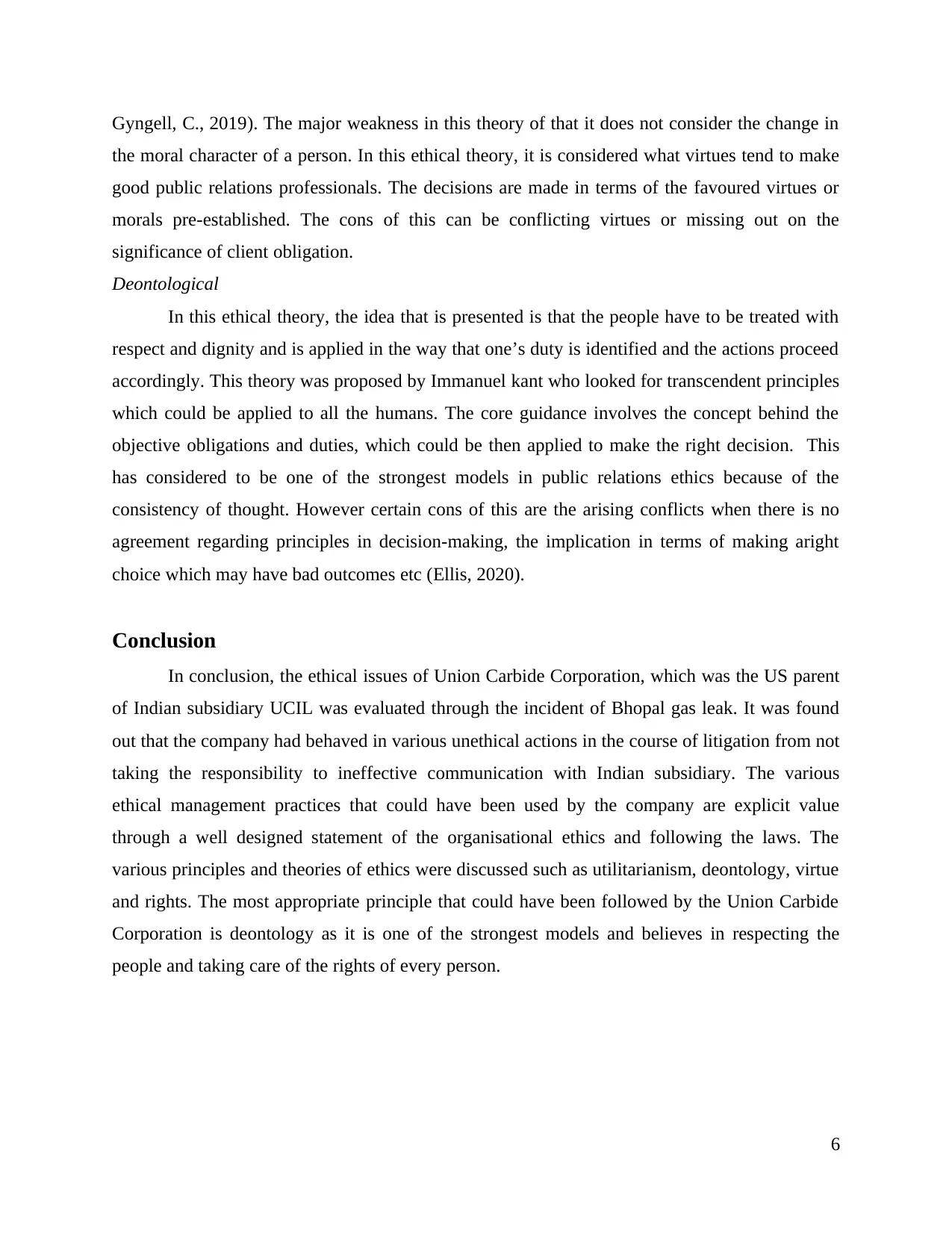
Gyngell, C., 2019). The major weakness in this theory of that it does not consider the change in
the moral character of a person. In this ethical theory, it is considered what virtues tend to make
good public relations professionals. The decisions are made in terms of the favoured virtues or
morals pre-established. The cons of this can be conflicting virtues or missing out on the
significance of client obligation.
Deontological
In this ethical theory, the idea that is presented is that the people have to be treated with
respect and dignity and is applied in the way that one’s duty is identified and the actions proceed
accordingly. This theory was proposed by Immanuel kant who looked for transcendent principles
which could be applied to all the humans. The core guidance involves the concept behind the
objective obligations and duties, which could be then applied to make the right decision. This
has considered to be one of the strongest models in public relations ethics because of the
consistency of thought. However certain cons of this are the arising conflicts when there is no
agreement regarding principles in decision-making, the implication in terms of making aright
choice which may have bad outcomes etc (Ellis, 2020).
Conclusion
In conclusion, the ethical issues of Union Carbide Corporation, which was the US parent
of Indian subsidiary UCIL was evaluated through the incident of Bhopal gas leak. It was found
out that the company had behaved in various unethical actions in the course of litigation from not
taking the responsibility to ineffective communication with Indian subsidiary. The various
ethical management practices that could have been used by the company are explicit value
through a well designed statement of the organisational ethics and following the laws. The
various principles and theories of ethics were discussed such as utilitarianism, deontology, virtue
and rights. The most appropriate principle that could have been followed by the Union Carbide
Corporation is deontology as it is one of the strongest models and believes in respecting the
people and taking care of the rights of every person.
6
the moral character of a person. In this ethical theory, it is considered what virtues tend to make
good public relations professionals. The decisions are made in terms of the favoured virtues or
morals pre-established. The cons of this can be conflicting virtues or missing out on the
significance of client obligation.
Deontological
In this ethical theory, the idea that is presented is that the people have to be treated with
respect and dignity and is applied in the way that one’s duty is identified and the actions proceed
accordingly. This theory was proposed by Immanuel kant who looked for transcendent principles
which could be applied to all the humans. The core guidance involves the concept behind the
objective obligations and duties, which could be then applied to make the right decision. This
has considered to be one of the strongest models in public relations ethics because of the
consistency of thought. However certain cons of this are the arising conflicts when there is no
agreement regarding principles in decision-making, the implication in terms of making aright
choice which may have bad outcomes etc (Ellis, 2020).
Conclusion
In conclusion, the ethical issues of Union Carbide Corporation, which was the US parent
of Indian subsidiary UCIL was evaluated through the incident of Bhopal gas leak. It was found
out that the company had behaved in various unethical actions in the course of litigation from not
taking the responsibility to ineffective communication with Indian subsidiary. The various
ethical management practices that could have been used by the company are explicit value
through a well designed statement of the organisational ethics and following the laws. The
various principles and theories of ethics were discussed such as utilitarianism, deontology, virtue
and rights. The most appropriate principle that could have been followed by the Union Carbide
Corporation is deontology as it is one of the strongest models and believes in respecting the
people and taking care of the rights of every person.
6
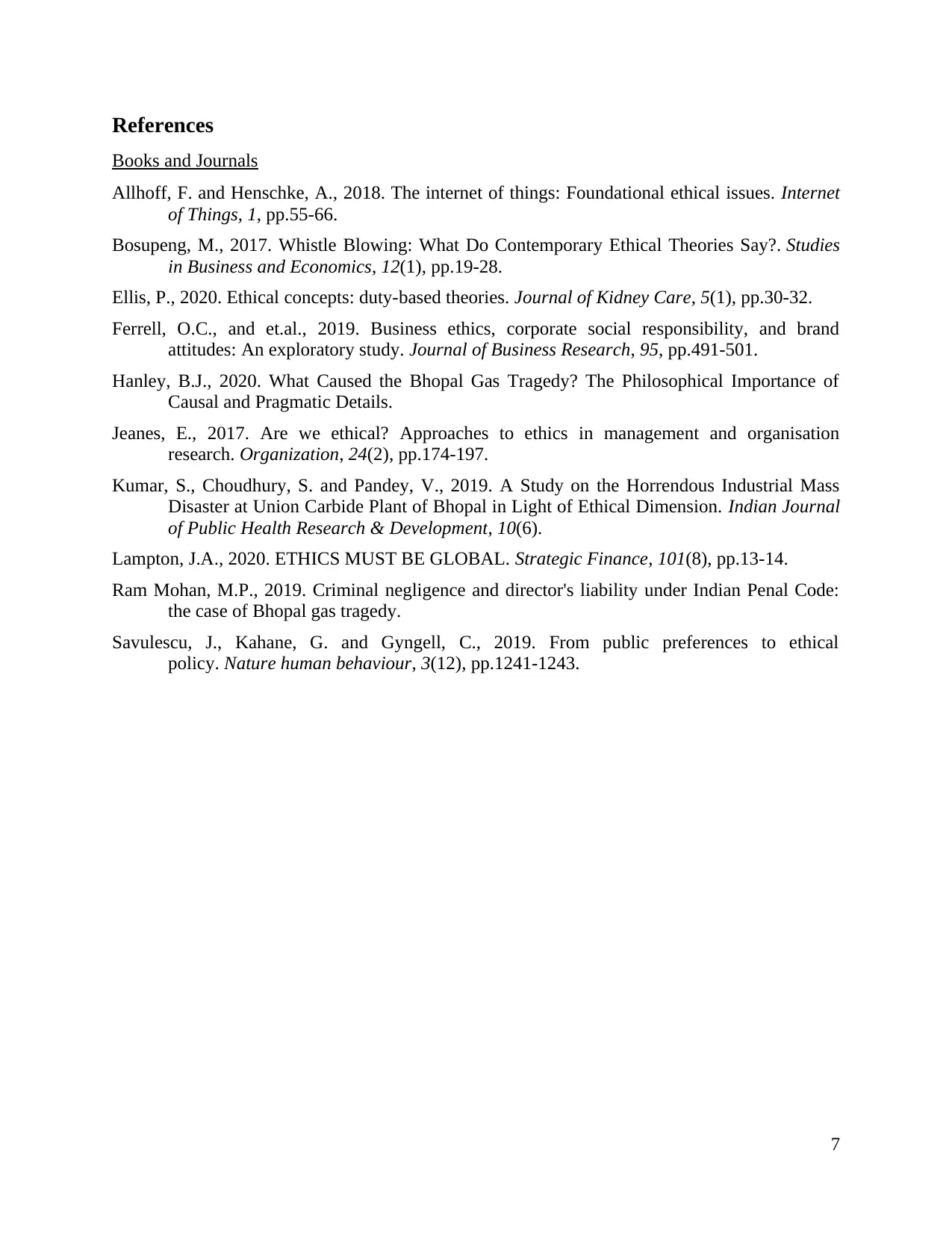
References
Books and Journals
Allhoff, F. and Henschke, A., 2018. The internet of things: Foundational ethical issues. Internet
of Things, 1, pp.55-66.
Bosupeng, M., 2017. Whistle Blowing: What Do Contemporary Ethical Theories Say?. Studies
in Business and Economics, 12(1), pp.19-28.
Ellis, P., 2020. Ethical concepts: duty-based theories. Journal of Kidney Care, 5(1), pp.30-32.
Ferrell, O.C., and et.al., 2019. Business ethics, corporate social responsibility, and brand
attitudes: An exploratory study. Journal of Business Research, 95, pp.491-501.
Hanley, B.J., 2020. What Caused the Bhopal Gas Tragedy? The Philosophical Importance of
Causal and Pragmatic Details.
Jeanes, E., 2017. Are we ethical? Approaches to ethics in management and organisation
research. Organization, 24(2), pp.174-197.
Kumar, S., Choudhury, S. and Pandey, V., 2019. A Study on the Horrendous Industrial Mass
Disaster at Union Carbide Plant of Bhopal in Light of Ethical Dimension. Indian Journal
of Public Health Research & Development, 10(6).
Lampton, J.A., 2020. ETHICS MUST BE GLOBAL. Strategic Finance, 101(8), pp.13-14.
Ram Mohan, M.P., 2019. Criminal negligence and director's liability under Indian Penal Code:
the case of Bhopal gas tragedy.
Savulescu, J., Kahane, G. and Gyngell, C., 2019. From public preferences to ethical
policy. Nature human behaviour, 3(12), pp.1241-1243.
7
Books and Journals
Allhoff, F. and Henschke, A., 2018. The internet of things: Foundational ethical issues. Internet
of Things, 1, pp.55-66.
Bosupeng, M., 2017. Whistle Blowing: What Do Contemporary Ethical Theories Say?. Studies
in Business and Economics, 12(1), pp.19-28.
Ellis, P., 2020. Ethical concepts: duty-based theories. Journal of Kidney Care, 5(1), pp.30-32.
Ferrell, O.C., and et.al., 2019. Business ethics, corporate social responsibility, and brand
attitudes: An exploratory study. Journal of Business Research, 95, pp.491-501.
Hanley, B.J., 2020. What Caused the Bhopal Gas Tragedy? The Philosophical Importance of
Causal and Pragmatic Details.
Jeanes, E., 2017. Are we ethical? Approaches to ethics in management and organisation
research. Organization, 24(2), pp.174-197.
Kumar, S., Choudhury, S. and Pandey, V., 2019. A Study on the Horrendous Industrial Mass
Disaster at Union Carbide Plant of Bhopal in Light of Ethical Dimension. Indian Journal
of Public Health Research & Development, 10(6).
Lampton, J.A., 2020. ETHICS MUST BE GLOBAL. Strategic Finance, 101(8), pp.13-14.
Ram Mohan, M.P., 2019. Criminal negligence and director's liability under Indian Penal Code:
the case of Bhopal gas tragedy.
Savulescu, J., Kahane, G. and Gyngell, C., 2019. From public preferences to ethical
policy. Nature human behaviour, 3(12), pp.1241-1243.
7
1 out of 7
Related Documents
Your All-in-One AI-Powered Toolkit for Academic Success.
+13062052269
info@desklib.com
Available 24*7 on WhatsApp / Email
![[object Object]](/_next/static/media/star-bottom.7253800d.svg)
Unlock your academic potential
© 2024 | Zucol Services PVT LTD | All rights reserved.





